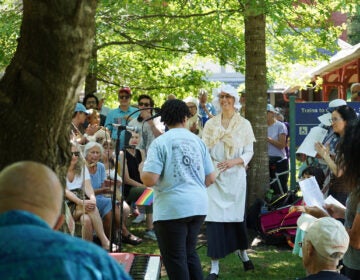Are spiteful ‘haters’ to blame for an unsolved parrot-napping in Nicetown?
Josie couldn’t fly, but she could say “hello.”
A Hunting Park household is grieving over the loss of its beloved pet parrot Josie, who was taken from her perch on their porch on the 1900 block of W. Hunting Park Ave. in the early evening hours of Oct. 21.
Cheron Ross, a nursing assistant who said she has lived in Hunting Park “forever,” recalled that she and her husband Larry left Josie on the porch’s rail while stepping out for a few hours to go to the store.
Upon their return, the parrot had vanished without a trace.
“Nobody saw anything or heard anything,” said Ross.
A disabled bird
While leaving a winged creature unattended might appear to be a questionable practice for a bird owner, Josie had a degenerative muscle disorder that prevented the blue and gold macaw from flying.
Even walking was a problem due to this condition.
“She walked bow-legged,” Ross recalled. “She thought she was a duck.”
Josie, who was 26 years old, was given to Ross about three years ago by her sister, who owns several other birds.
Prior to her disappearance, Josie had two pit bulls, a cat and a turtle as playmates. It was an animal-friendly household.
The parrot was also well-regarded in the neighborhood, with neighbors often being greeted with a high-pitched “Hello.”
“She was like one of the kids,” observed Ross, who added that Josie would often come to eat with the residents of the household, favoring human food over typical parrot provisions.
“She didn’t want berries and all that,” said Ross. “We tried.”
According to Kristine Collins, manager of Bird Paradise in Burlington Twp., NJ, that sort of inclusion is big part of ownership for affectionate parrots.
“They’re a flocking animal,” said Collins. “They need to be part of the family.”
Where is Josie?
Since being taken from her flock, Josie’s whereabouts remain unknown. She hasn’t turned up at the Pennsylvania SPCA.
Wendy Marano, spokesperson for the PSPCA, said that the theft wasn’t reported to her organization, nor have there been any intakes of parrots in recent days.
Marano explained that the organization maintains a file of lost animals; when animals come in, they are cross-checked against that list.
In order to get the police perspective on purloined parrots, NewsWorks conducted an informal poll of police department officials both in the Northwest Philadelphia and citywide.
The four spokespersons in the police department’s media-relations unit had never heard of such a crime in Philadelphia, nor had a sampling of department members. One jokester with a badge responded that the question “flew right over his head.”
Parrotnappings rare, but not unheard of
One officer from Southwest Philadelphia cited the case of two pet parrots being swiped from a Houston, Texas pet store last year; each was valued in the low four-figure range.
In another Lone Star state bird-related incident, a Dallas woman walked out of a store with a $1,700 red Eclectus parrot in September.
This bird was later returned by an animal rescuer who said he purchased the bird on the street from a homeless man for $100. The suspect left her purse and ID at the store. Dallas Police confirmed on Thursday afternoon that a homeless woman, Priscilla Kaiser, 55, was arrested on theft charges shortly after the bird’s return.
In June, a parrot was stolen from outside a northwest Chicago home in a bird-brained snatch-and-grab. Bufford, a red macaw, was sitting on a fence with a second parrot, Sam, when two suspects pulled up in a black jeep Cherokee and took the birds.
Sam bit his would-be thief and got away, but Bufford was unable to escape their clutches.
Divorce often to blame
Collins said that while rumors circulate locally about thefts from time to time, the only parrot-takings that came to mind stem from divorces.
However, she wasn’t wholly surprised by the episode, observing that many are aware of the value of the birds, which can range from $1,500 to $13,000 depending on the breed.
She explained that her store doesn’t buy birds off the street.
“It’s too fishy,” she said, adding that the only parrot intakes that they might perform are if documentation is present or if the bird was in distress.
Given the sensitive nature of the species, Collins cautioned would-be parrot thieves against the practice.
“If you don’t know what to do with them,” she said, “it’s a bad way to make a buck.”
Josie’s family worries and waits
Since the theft, Ross has been wiping away the tears and has resumed speaking with her husband, though both took a few days. She has been fretting over Josie’s condition.
“Do they know how to take care of her?” asked Ross. “If they ignore her, and she screams, are they going to get tired of that? Will they just put her outside?”
Questions also persist about who took the bird, and why.
“There are a million people outside, especially on a Friday,” said Ross. “Everybody knows my bird. I think somebody just took her out of jealousy, just to be mean and hateful.”
“Just haters,” added Jimmy Weems, Ross’s brother-in-law.
He then provided a glimpse into the importance of Josie. Not that you can put a price on love, but Josie’s value was listed at $2,500 on a police report.
“She was worth more than that,” said Weems. “She was part of the family. You can’t put a price tag on that.”
For Ross, the resultant sorrow has been even more costly.
“I don’t think I’m going to get another bird,” she said.
If you have any information about Josie’s whereabouts, you can call the police department’s tipsline at (215) 686-8477, text a tip to PPD TIP (773847) or send it in via the department’s website.
WHYY is your source for fact-based, in-depth journalism and information. As a nonprofit organization, we rely on financial support from readers like you. Please give today.




